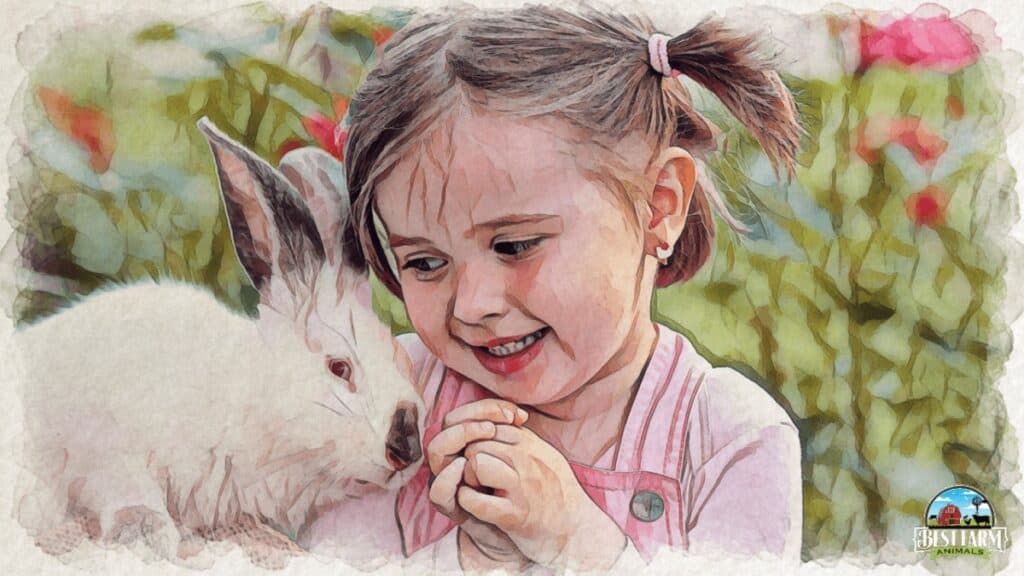Rabbits make excellent pets. They’re super fun and enthusiastic. I have an English Lop Rabbit named Eddie, and he’s very active and playful. It didn’t take long to train and bond with Eddie, although there were times that he had me thinking he wasn’t too fond of me.
Once we worked through the difficult times, our bond became deeper and deeper, and now he is my best friend for life. It’s never easy to train a bunny, but patience and understanding make a world of difference.
Are rabbits affectionate? Rabbits are highly affectionate and social animals if given a chance. These pets form powerful bonds with other rabbits and people. They will show you affection through licking and binkying. What’s more, the bond you build can last a lifetime. With patience, your bunny can learn to trust and love you.
Unlike other animals, rabbits don’t make sounds to express their affection. Instead, they show it through actions. A rabbit loves you when it approaches, grooms, or sleeps near you. Loving rabbits always tend to seek your attention and your company.
Do you want to know more about rabbit behaviors and the most affectionate rabbit breeds? Find out below.
Are Rabbits Affectionate to Humans?
Rabbits show affection to humans that they bond with, especially if they spend significant amounts of time with their owners. Rabbits form life-long bonds. They are herd animals and become emotionally dependent on the person or rabbit they consider to be part of their herd.
Rabbits are affectionate to their companion and rely on having a favorite person. This may take some time, but once a bunny has bonded, it can become very dependent on its person or partner and thoroughly enjoy being around them.
Rabbits pick favorites and develop a deeper attachment to their owners based on extra interaction like playing or grooming. The more time you spend playing, loving, and grooming your bunny, the more likely they’ll pick you as their person.
Rabbit Bonding With Humans
Once a rabbit loves you and bonds with you, it will lick, flop, chin, binky, or purr like cats. When they feel safe and have started connecting with you, your pet will show you how much they love you through rabbit body language. Although it’s easier for rabbits to bond with other rabbits, they can and do bond with people.
Always remember that rabbits are prey animals, so it’s entirely normal that they may seem shy or nervous in the early stages of having them as pets.
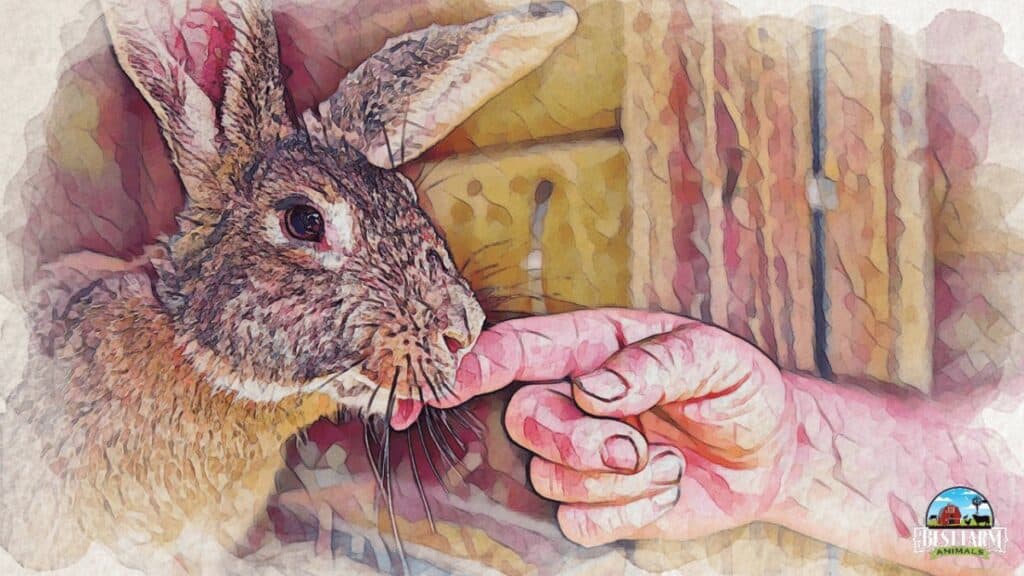
3 Ways to Bond With Your New Rabbit Fast
Your rabbit will bond with you faster if you earn its trust, show that you are dependable, spend a lot of time with it, and are playful with it. That sounds simple, but you can do several things to fulfill all of your rabbits’ emotional needs.
1. Spend Time Sitting With Your Rabbit Every Day
Rabbits bond with the rabbit or person that they spend a lot of time with. If you want to bond with your rabbit, you should plan to spend at least 3-4 hours a day with it. Time is essential for your rabbit to bond with you.
Once your rabbit has bonded with you, she will still need to spend a lot of time with you daily to fulfill her companionship needs. Playing and hanging out together will help increase your rabbits’ affection toward you. But spending time looks different between kids and adults.
For many kids, that may mean keeping the rabbit cage in the room and frequently playing with the rabbit during the day. For adults who love their rabbits, it often means allowing the bunny to spend time outside its cage and follow the adult around.
Time with your rabbit can be spent while reading or watching TV. Rabbits can be litter trained so they don’t leave a mess around the house. Even if you aren’t comfortable letting out your rabbit from its cage, consider keeping the cage in a room that you spend significant time in so that you can talk to it and spend time with it during the day.
2. Let Your Bunny Come to You To Build Trust and Increase Bonding
Let your rabbit come to you in all interactions. This is essential for building trust and increasing bonding. Your bunny should approach you for treats, to be petted, and to play. It should also come when it wants to eat, participate in grooming, or show your affection.
Although you may want to hold and love and pet your rabbit to bond with it, you must also allow your rabbit to set the terms of your loving interactions. Your rabbit must trust you before he will grow attached to you.Rabbits instinctively guard against anything scary because they are hunted so readily in the wild.
Don’t force your bunny to love you; be patient and just let them come to you. While you wait, sit still and allow your rabbit to investigate. They’re naturally curious, so they’ll spend a reasonable amount of time sussing you out. Rabbits are prey animals, making them shy and easily scared of people; you don’t want that to happen.
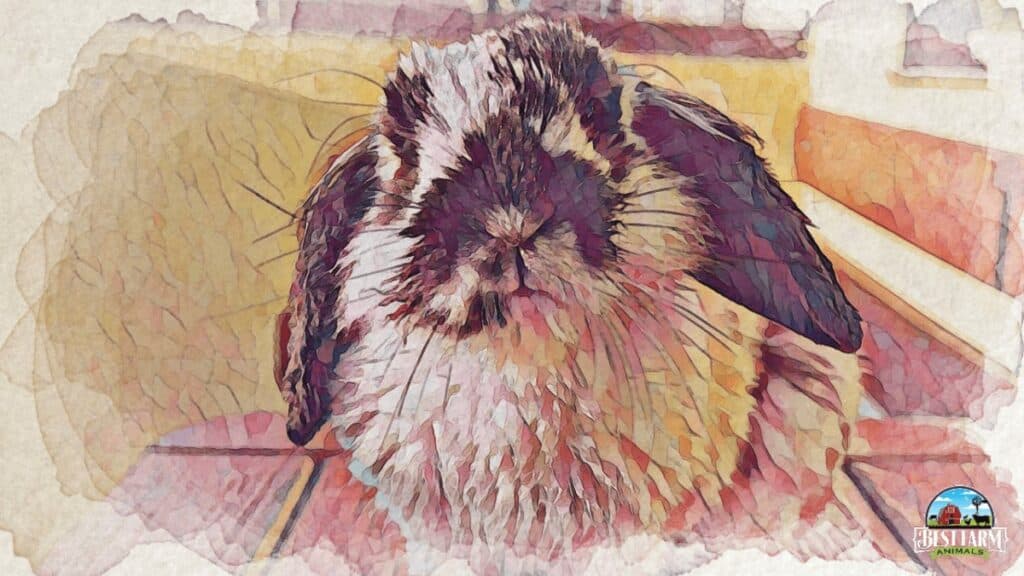
3. Be Dependable To Your Bunny To Increase Its Affection For You
It is essential that your rabbit trust and depend on you before it will feel a bond of affection for you. Your rabbit must be able to know that you are dependable.Being dependable in your rabbit’s eyes includes providing a regular routine and avoiding any actions that will frighten it.If you establish a regular routine with your rabbit so he can anticipate getting fed, played with, and taken out of the cage, he will do better bonding.
When bonding with your rabbit, make yourself smaller. Sitting or lying down makes you feel smaller and more like another bunny to your rabbit. Your rabbit would naturally bond with other rabbits but is naturally fearful of larger animals. By lying down or sitting with your rabbit, she learns to feel trust toward you and will love you faster.
Your rabbit will be less hesitant to come to you, making it easier to build a connection. When you stand up, move slowly, so you don’t scare the bunny and make them run away. Rabbits tend to lie down to show that they’re relaxed.
Relaxation is an essential part of bunny bonding, so copying them increases their emotional connection to bonding in their brain. Rabbits do not bond well when they are scared or anxious. Relation and trust increase the likelihood that they will bond with you.
In the same manner, playing the same games with your rabbit helps her to anticipate the games it will have and decrease her fear of the unknown. In all your interactions with your bunny, strive to be predictable and dependable. This will help your bunny to bond with you with greater affection.
How Long Does it Take For a Rabbit to Bond With a Person?
Rabbit owners have to spend an average of two and a half weeks to bond with their pet rabbit fully. For some, the bonding session can take a few months, depending on the rabbit breed and how comfortable they’re with people.
It’s important never to rush a rabbit to bond with you, especially if you only have him for a few weeks. Rabbits are prey animals, so they can get easily scared by even the smallest things.
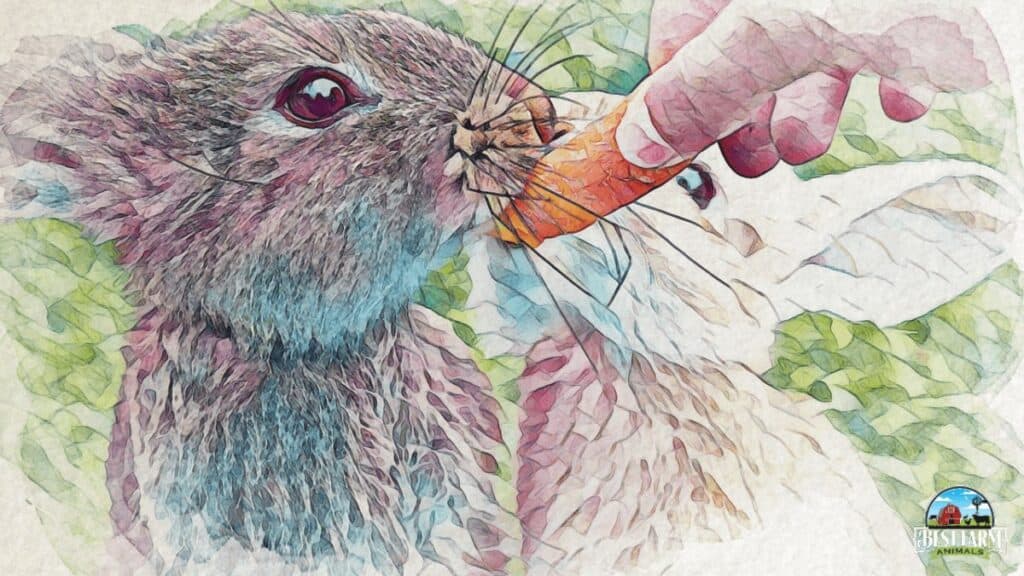
6 Rabbit Affection Signs: When Your Rabbit Has Bonded With You
When a rabbit licks, binkies, rubs its chin, flops onto its side, and purrs, it’s more likely a sign that your rabbit loves you more than anything. If your pet doesn’t do any of these, don’t worry! You can do some tricks to make them love you, which we will tackle in another section.
Rabbits are very affectionate animals and they show their love through specific body language.
1. Rabbit Cleans Itself in Front of You to Show They Love You
When a rabbit cleans or licks itself in front of you, it means they love you. Rabbits lick as a grooming instinct and they will lick their companion to show love and affection. They will only groom a person when they have bonded and consider them their friend.
Don’t avoid a rabbit when it licks you, no matter how weird it may feel. This may cause him to stop getting close to you as if you’re rejecting his love.
2. Rabbit Flops to Express Happiness and Trust
Flopping is when your bunny flips onto its side, expressing happiness and trust. Only when your rabbit is content will it flop over and relax. Rabbits only flop on the side when they have extreme trust and are very content.
The rabbit’s flopped body is one of the most vulnerable positions one can be in, leaving them utterly defenseless against predators. Thus, they trust you to look out for them when they lie like this.
However, don’t confuse this move when the rabbit is in a crouched position and has very tense muscles. According to UK’s RSPCA website, a rabbit that puts its head on the floor might mean that it’s anxious and doesn’t want to be petted.
3. Rabbit Rubs Chin to Show Obsession to Owner
Chinning is how a rabbit marks its territory and shows its obsession with its owner. If your bunny places its chin onto your body, it claims you as theirs. It may be a strange experience when a rabbit chins you for the first time.
They may also brush against you with their chin like a cat or forcefully push against you like a dog. However, you should also take care with rabbit bucks, as chinning can be a sign they’re looking to spray you and claim dominance.
4. Rabbit Jumps in the Air or Binkies to Express Excitement and Joy
When your rabbit binkies or jumps in the air, it expresses joy and excitement. When rabbits are affectionate toward a person, this behavior is more frequent. Binkies are when rabbits run around and around a person expressing happiness. Like a dog getting the zoomies, a rabbit will run around with great speed and leap into the air to show how excited, and happy they are.
Domestic rabbits are more likely to binky because they want to show their owners that they feel pretty good.
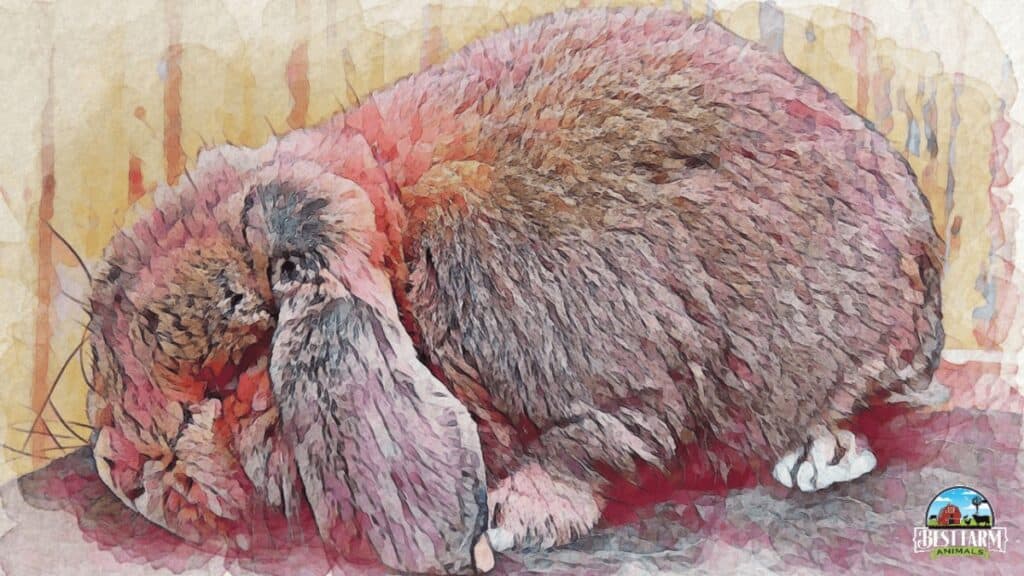
5. Rabbit Purrs to Say Thank You And Show Contentment
Your rabbit will purr like a cat when scratched and tickled, which means it’s content and grateful for the attention you’re giving them. Unlike cats that use their throats to purr, rabbits produce the purring sounds by rubbing their teeth together, which you shouldn’t be worried about; instead, you should listen to the sound intently.
6. Rabbit Chooses to Spend Time Close to You
You can tell that a rabbit has successfully bonded with you when it’s constantly sitting near you or your lap. Not all bunnies will climb unto a human’s lap, so if your rabbit wants to jump into your lap, that’s a great sign. They will also binky (jumps high and quickly twists their head or hind end) when they see you.
Also, take note of a rabbit’s movement when you’re around. A rabbit that likes you will usually circle around your legs. Just like dogs or cats, rabbits will like to be petted by their owners, which can make them produce purr sounds. Most of the time, rabbits will also groom or lick you, or even call you out for attention.
Most Affectionate Rabbit Breeds To Bond With
The most affectionate rabbit breeds are English Lop Rabbit, Flemish Giant Rabbit, Lionhead Rabbit, English Spot Rabbit, and Standard Chinchilla Rabbit. These rabbit breeds are also the most popular breeds raised as pets at home.
In general, there are over 305 different registered domestic breed bunnies. Some bunny breeds are lazy, shy, and calm, and others are energetic and active, making it extremely hard to pick a breed of bunny. If it’s your first time, you need to pick a breed that’s best for you carefully. It’s better to choose a rabbit that has the same characteristics as yourself.
English Lop Rabbit: Lovable And Easy to Play With
The English Lop Rabbit is one of the most lovable rabbit breeds that can easily play with you if given a chance. This breed is popular because of its laid-back personality and friendliness to people. English Lop is playful, gentle, and easy to train. Although it’s one of the friendliest rabbit breeds, you don’t often see them as home pets because they’re high maintenance.
An English Lop Rabbit’s ears are super sensitive, so they can easily be infected, which is also the reason they’re more vulnerable to cold temperatures.
Flemish Giant Rabbit: Likes to be Cuddled And Hugged
The Flemish Giant Rabbit, is a very docile rabbit breed that likes to be cuddled and hugged. This rabbit breed is great to raise at home because they’re super intelligent and can recognize individual human faces. They’re great for training to do simple tricks such as coming when called, spinning, or giving you kisses.
Lionhead Rabbit: Friendliest And Happy to Cuddle
The Lionhead Rabbit is one of the friendliest and most affectionate rabbit breeds who like to be cuddled, but only when it’s comfortable with you. This breed is tolerant of kids and is super sweet. It is suitable for any age or even first-time owners because they’re naturally affectionate to people. But, just like any bunny, don’t force yourself on them, or they could bite.
Lionhead is also among the most eye-catching rabbit breeds because of its unique thick furry features.
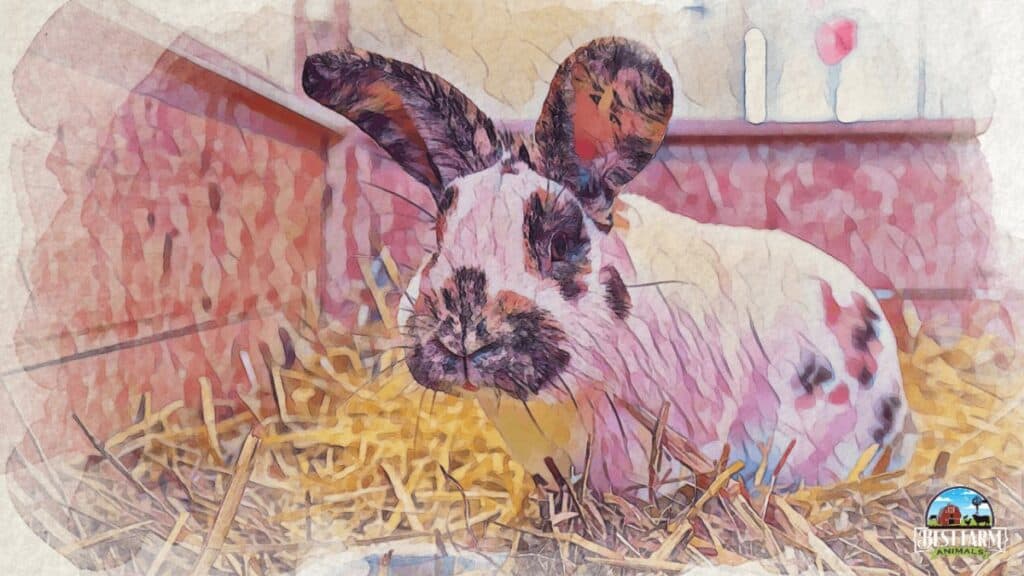
English Spot Rabbit: Loves to be Picked Up And Petted
The English Spot Rabbit is a sweet-natured rabbit breed that is super kind and friendly to people. They like to be picked up and petted, which is normal for them because they’re also “show-rabbits.”
They have unique markings of different colors all over their bodies, which makes them stand out from the crowd. An English Spot Rabbit isn’t the most active, but they’re not boring pets.
Standard Chinchilla Rabbit: Sweet And Enjoys Being Petted
The Standard Chinchilla Rabbit enjoys being petted and has the sweetest personality towards people who adore them mainly because of their small size. However, owners have to be gentle in handling them they’re a smaller rabbit breed. Thus, they’re also common as toddler pets.
It’s not an issue for them to play outside or inside as long as they get to roam and stretch their legs to their full length.
Bond With Your Shy Rabbit Faster
You can quickly form a bond with your shy rabbit by always being close to them or letting them approach you without forcefulness. The more time you spend with your shy rabbit, the faster he or she will trust you and bond with you.
It is also critical to always talk calmly around your rabbit and not to make sudden noises or jerky motions. You can also twitch your nose, lay down with them, or jump like a rabbit to let them know that you’re being friendly and not going to hurt them. If your rabbits know they can trust you, it’ll be easier to bond with them without being forceful.
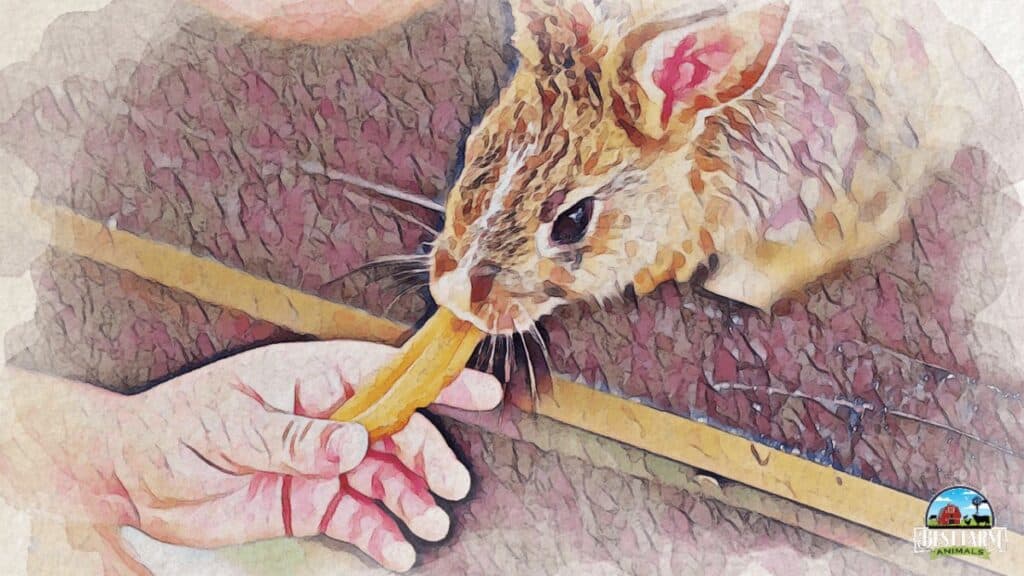
How to Make Your Bunny Like You?
First, establish a solid trust relationship to get your bunny to like you. Second, be dependable and take good care of your bunny by providing treats, never scaring her, and having a solid routine. Third, play with, feed, and care for your bunny. Grooming your rabbit will also help him or her to like you more.
Many rabbits love to be petted on their cheeks and foreheads. You can also try stroking your rabbit’s back, nuzzling your nose to their faces, or just mimicking its actions and making yourself small.
How to Make Your Rabbit Come to You?
A rabbit will come to you when it’s called if you sit next to them, reward them if they get close to you, start to call them names, or leave them treats. It’s also helpful not to directly look at them since they can easily sense if you’re looking. Try to relax and act like a rabbit carefully and silently.
When sitting next to your rabbit, don’t sit too close where they can sense even your slightest movements. Do this outside their open enclosure, so they can easily come near you once they’re ready. Rabbits are curious animals, so wait and sit every day until your pet tries to make an attempt to get close to you.
While doing this, you can also leave treats outside the rabbit enclosure. The rabbit will soon register your presence with a treat, making him feel safer to get near you. If the rabbit walks outside its enclosure and comes to you, don’t freak out and give him more treats as a reward.
Do this regularly without forcing or scaring your rabbit; you might have to go back to step one.
Easy Steps to Teach Rabbit to Come Near You
- Sit quietly outside the rabbit’s open enclosure
- Leave treats as you sit every day
- Wait for the rabbit to walk outside the enclosure
- Give the rabbit treats once it approaches you
- Repeat the above steps every day until he’s well-trained
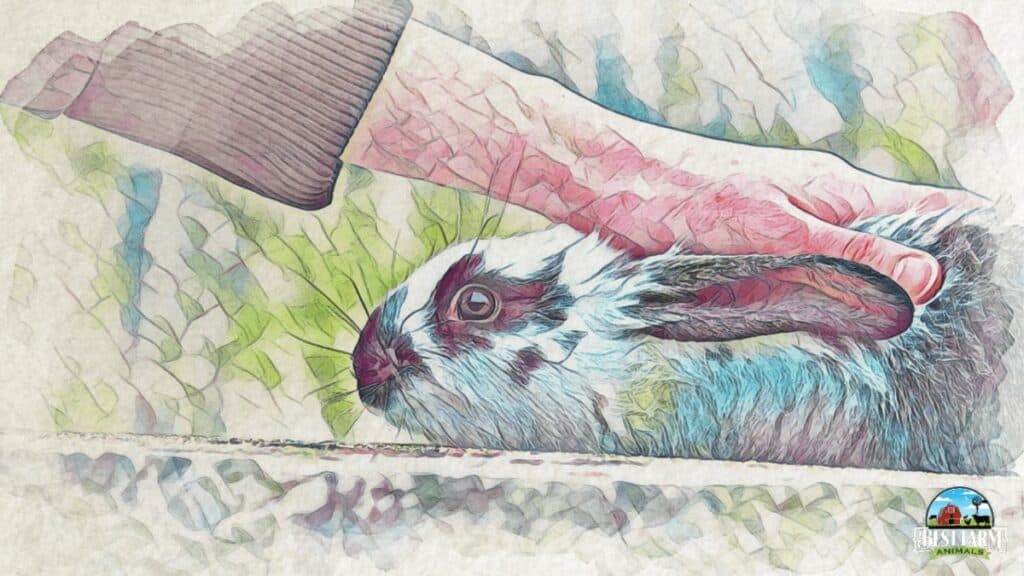
Do Rabbits Miss Their Owners?
Surely, rabbits can miss their owners, especially if you have bonded with them for a long time. Rabbits are social animals, so they like to be around the people they trust and love. If you leave, your bunnies will likely feel depressed and sad.
Some of the signs that your rabbit needs attention are aggressive behavior, overgrooming or not grooming at all, nipping, thumping and pulling hair, circling or pacing down, biting, and many more. Remember, if you miss your rabbit, most of the time, they miss you more!
Signs Your Rabbit Needs You:
- Nips other rabbits or its hair
- Circles or paces down
- Bites other animals or humans
- Pulls its hair
- Overgrooms or doesn’t groom at all
Bonding With Your Rabbit Ensures Better Health
Bonding with your bunny ensures that it’s well looked after and loved. It also makes basic health care much easier as your rabbit pet trusts you.
Once you earn your bunny’s affection and trust, they’ll easily allow routine health inspections and procedures. Your rabbit will need annual vaccinations against common bunny diseases. . Trimming your rabbit’s nails will also require that they trust you and allow you to restrain them and clip their nails.
When you have one bunny, they rely on you to make them feel safe during scary procedures such as vet checkups, tests, and neutering. Ensure you groom your rabbit regularly, especially for long-haired rabbits, and don’t be surprised when mutual grooming sessions between you and your rabbit end with you just loving each other.
Ways to Bond WithYour Rabbit and Frequency for Best Results Chart
| Methods to Bond With Your Rabbit | Frequency of Activity for Best Bonding Results |
| Give treats | Daily |
| Spend time not holding it | Daily |
| Spend time with your rabbit | Multiple Times a day. 3+ hours is best |
| Sit with Rabbit on the floor | At least daily, multiple times a day is best |
| Stay calm, Keep noise levels down | Always |
| Allow rabbit to come to you | Always |
| Follow a daily routine | Multiple times a day. Everytime you feed, etc |
| Train your rabbit | Daily if possible |
| Don’t chase or corner your rabbit | Always Avoid |
| Pet Rabbit | Multiple times a day |
| Mimic rabbit | Daily |
| Lear your rabbit’s body language | As soon as possible |
| Play with your rabbit (toys, games) | Daily |
| Respect your rabbit’s space, boundaries | Always |
Rabbit Affection FAQs
Rabbit affection comes in many forms, and owners should understand whether the rabbit’s behavior is positive. Treating our pets with the right affection can save them from possible anxiety and protect us from being suddenly bitten or harmed.
Do Bunnies Like To Be Cuddled?
Some bunnies like to be cuddled but on their terms. Most of them don’t like being picked up, so allow your rabbits to first come to you. Give them loads of strokes and gentle pats if they sit on your lap. Holding and cuddling your bunny is much easier once they trust you and have bonded with you.
What If My Rabbit Doesn’t Bond With Me?
You should be patient if your rabbit doesn’t seem to be bonding. Bonding with your bunny takes time; some rabbits take longer to bond than others. Work on cultivating an environment that encourages bonding.
Ensure your rabbit isn’t scared and other factors aren’t interfering with your bonding session such as a noisy or unsafe environment. You can mimic rabbit behavior, encourage happy times through toys and treats, and give your bunny control over bonding.
How to Tell If Your Rabbit is Ready To Be Trained?
You can tell that your rabbit is ready to be trained when it spends lots of time with you, shows strong signs of affection such as binkies, circles your legs, or wants to be petted. Your rabbit is also ready for training when it starts grooming you, purrs, and nudges you for attention.
Training is a great way to spend time with your bunny, help him or her to develop and provide exercise for your rabbit.
Conclusion
Rabbits are super cool affectionate pets to have. They’re loving, caring, enthusiastic, social, friendly, and highly intelligent—making them fun to train. Always be patient when training and bonding with your rabbit. You’ll be thrilled with the results once you have successfully trained them. Indeed, rabbits are great companions to have around. If you want to learn more about rabbits and some of their strange behaviors, read our guide on why rabbits stare at you.
Recommended Rabbit Supplies
This list contains affiliate products. Affiliate products do not cost more but helps to support BestFarmAnimals and our goal to provide farm animal owners with accurate and helpful information.
Housing: If your rabbit is indoor, you’ll need a cage, a hideout (to keep your rabbit from death by heart attack), and a space for it to get exercise and spend time with you. If you don’t want to let it run free in your house, this animal playpen provides space and keeps your rabbit from hiding under your couch.
If you keep your rabbit outdoors, an outdoor hutch that provides space and protection from predators is needed. (I’d still keep mine in a barn for further protection from the elements.)
You’ll also need bedding, toys, a grooming brush, and treats for your little friend. A litter box is important because rabbits can be potty trained. Timothy hay is the best kind of hay for rabbits as alfalfa is too sweet. Don’t forget a water drinker. I like the half-gallon waterer because it can cover two rabbits for several days. Pair it with a food bowl or a food manger (a little cleaner) and you’ll be set up!
If you want to treat your bunny to entertainment, a cat tower, a treat ball, or bunny toys all work wonderfully.
Finally, if you plan on taking your rabbit with you on trips, you’ll need a carrier. Here’s a small carrier or larger carrier that work great for occasional travel. If you travel a lot, you might want the carrier that’s rated #1 in safety for safe travels
Lastly, I use this odor eliminator for accidents and to wipe out the bottom of the cage and litter box when I clean it.

